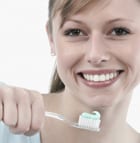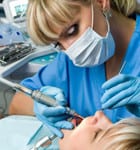 Mouth ulcers can appear for numerous reasons, making eating, drinking and talking a painful experience. The vast majority of people will have the unpleasant experience of a mouth ulcer at some point in their lives. For some it is a short experience which, though uncomfortable, quickly heals and disappears. For others, numerous mouth ulcers can appear, become highly inflamed and make everyday life miserable. Whichever is your situation, your Central Leeds dental surgery will have a range of preventative measures and treatments to help deal with the problem.
Mouth ulcers can appear for numerous reasons, making eating, drinking and talking a painful experience. The vast majority of people will have the unpleasant experience of a mouth ulcer at some point in their lives. For some it is a short experience which, though uncomfortable, quickly heals and disappears. For others, numerous mouth ulcers can appear, become highly inflamed and make everyday life miserable. Whichever is your situation, your Central Leeds dental surgery will have a range of preventative measures and treatments to help deal with the problem.
The most frequent cause of mouth ulcers is a cut to the inside of the mouth. These cuts can easily become infected and inflamed. To prevent this be extra careful when eating hard and sharp foods that could be damage to the lining of your mouth. For some people ulcers can be a chemical reaction caused by a range of products, alcohol and aspirin are two common causes. If you have had unprotected sex there is the possibility you have contracted herpes, mouth ulcers are a obvious symptom of this, you can have a health check from your local GP or sexual health clinic if you think this might be the case.
There is no single, ideal treatment for mouth ulcers. Generally it is a matter of waiting for the ulcer to heal and beginning preventative measures for the future. Eliminating any chemical or food products that may be causing the ulcers is the best first step. If you find your are consistently biting your cheek, your dentist may recommend filing down a tooth if it is particularly sharp. Gargling water with either salt or paracetamol will provide temporary relief from the pain.














